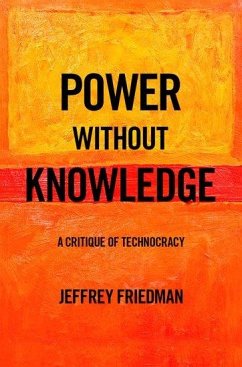- Gebundenes Buch
- Merkliste
- Auf die Merkliste
- Bewerten Bewerten
- Teilen
- Produkt teilen
- Produkterinnerung
- Produkterinnerung
Do leading social-scientific experts, or technocrats, know what they are doing? In Power without Knowledge, Jeffrey Friedman maintains that they do not. Friedman shows that people are too heterogeneous to act as predictably as technocracy requires of them. Technocratic reason, then, entails a drastically oversimplified understanding of human decision making in modern society.
Andere Kunden interessierten sich auch für
![Wars Without End Wars Without End]() Noel AndersonWars Without End110,99 €
Noel AndersonWars Without End110,99 €![Cannibals all! or, Slaves Without Masters Cannibals all! or, Slaves Without Masters]() George FitzhughCannibals all! or, Slaves Without Masters40,99 €
George FitzhughCannibals all! or, Slaves Without Masters40,99 €![Freedom Without Violence Freedom Without Violence]() Dustin Ells HowesFreedom Without Violence73,99 €
Dustin Ells HowesFreedom Without Violence73,99 €![Empires Without Imperialism Empires Without Imperialism]() Jeanne MorefieldEmpires Without Imperialism42,99 €
Jeanne MorefieldEmpires Without Imperialism42,99 €![A Middle Class Without Democracy A Middle Class Without Democracy]() Jie ChenA Middle Class Without Democracy41,99 €
Jie ChenA Middle Class Without Democracy41,99 €![Speaking Science to Power Speaking Science to Power]() Speaking Science to Power127,99 €
Speaking Science to Power127,99 €![Change the World Without Taking Power Change the World Without Taking Power]() John HollowayChange the World Without Taking Power120,99 €
John HollowayChange the World Without Taking Power120,99 €-
-
-
Do leading social-scientific experts, or technocrats, know what they are doing? In Power without Knowledge, Jeffrey Friedman maintains that they do not. Friedman shows that people are too heterogeneous to act as predictably as technocracy requires of them. Technocratic reason, then, entails a drastically oversimplified understanding of human decision making in modern society.
Hinweis: Dieser Artikel kann nur an eine deutsche Lieferadresse ausgeliefert werden.
Hinweis: Dieser Artikel kann nur an eine deutsche Lieferadresse ausgeliefert werden.
Produktdetails
- Produktdetails
- Verlag: Oxford University Press
- Seitenzahl: 408
- Erscheinungstermin: 15. Januar 2020
- Englisch
- Abmessung: 239mm x 158mm x 39mm
- Gewicht: 680g
- ISBN-13: 9780190877170
- ISBN-10: 0190877170
- Artikelnr.: 57359516
- Herstellerkennzeichnung
- Libri GmbH
- Europaallee 1
- 36244 Bad Hersfeld
- gpsr@libri.de
- Verlag: Oxford University Press
- Seitenzahl: 408
- Erscheinungstermin: 15. Januar 2020
- Englisch
- Abmessung: 239mm x 158mm x 39mm
- Gewicht: 680g
- ISBN-13: 9780190877170
- ISBN-10: 0190877170
- Artikelnr.: 57359516
- Herstellerkennzeichnung
- Libri GmbH
- Europaallee 1
- 36244 Bad Hersfeld
- gpsr@libri.de
Jeffrey Friedman, a Visiting Scholar in the Charles and Louise Travers Department of Political Science, University of California, Berkeley, is the editor of Critical Review: A Journal of Politics and Society, the editor of The Rational Choice Controversy: Economic Models of Politics Reconsidered (Yale University Press), and coauthor of Engineering the Perfect Storm: The Financial Crisis and the Failure of Regulation. He has taught political and social theory at Barnard College, Columbia University, Dartmouth College, Harvard University, and Yale University.
* Acknowledgments
* Preface
* Introduction: Technocracy and Political Epistemology
* -The Absence of an Argument for Technocratic Knowledge
* -Technocracy and Distributive Justice
* -Technocratic Regulation and the Limits of State Autonomy
* -The Technocratic Value Consensus
* -The Politics of Negative Utilitarianism
* -Citizens as Technocrats
* -Distortions Caused by the Standard Definition of Technocracy
* -The Public-Choice Alternative
* -Democratic Technocracy and Nationalism
* -Outline of the Book
* Part I. Belief, Interpretation, and Unpredictability
* Chapter 1: Technocratic Naïveté
* -Naïve Realism and the Fact of Technocratic Disagreement
* -Four Types of Technocratic Knowledge and the Possibility of
Unintended Consequences
* -Naïve Realism as a Methodological Problem
* -A Criterion of Technocratic Legitimacy and the Theodicy of
Technocracy
* Chapter 2: Lippmann and Dewey: The Unjoined Debate
* -Lippmann and Progressive Epistemology
* -Lippmann's Political Epistemology
* -Dewey's Defense of Democratic Technocracy
* -The Fundamental Dilemma of Democratic Technocracy
* -Dewey's Evolving Defenses of Policy Science
* Chapter 3: Technocracy and Interpretation
* -Dewey's Evolutionary Epistemology
* -Heterogeneous Beliefs and Environmental Unpredictability
* -Epistemological Individualism
* -Intellectual History and the Practical Problems of Technocracy
* -Homogenizing Factors
* Part II. Toward an Empirical Epistemology of Technocracy
* Chapter 4: The Pathological Pressure to Predict
* -Economics and the Assumption of Effective Omniscience
* -Economics as a Policy Science
* -The Taming of Ignorance by Behavioral Economics
* -Econometrics and the Confrontation with Heterogeneity
* -Non-Technocratic Social Scientists Who Think Like Technocrats
* Chapter 5: Epistocracy and the Spiral of Conviction
* -The Spiral of Conviction
* -The Spiral of Conviction among Experts
* -The Financial Crisis in Retrospect: The Economist as Ideologue
* Chapter 6: Public Ignorance and Democratic Technocracy
* -Public Ignorance as an A-Fortiori Argument for Epistocracy
* -The Unfulfilled Promise of Heuristics Research
* -Public Ignorance: Radical, Not Rational
* -A Bias for Technocratic Action
* -Simple Heuristics for a Complex World
* -Systemic Pressures in a Democratic Technocracy
* Part III. Exitocracy
* Chapter 7: Capitalism, Socialism, and Technocracy
* -A Revised Standard of Technocratic Legitimacy
* -Exit and Voice
* -The Public-Private Asymmetry in Voice
* -Some Epistemic Limits of Exit
* -An Exitocratic Difference Principle
* -No Exit Redux: Epistemic and Cultural Critiques
* -Exit and Human Happiness
* Afterword
* Technocracy and the Left
* References
* Preface
* Introduction: Technocracy and Political Epistemology
* -The Absence of an Argument for Technocratic Knowledge
* -Technocracy and Distributive Justice
* -Technocratic Regulation and the Limits of State Autonomy
* -The Technocratic Value Consensus
* -The Politics of Negative Utilitarianism
* -Citizens as Technocrats
* -Distortions Caused by the Standard Definition of Technocracy
* -The Public-Choice Alternative
* -Democratic Technocracy and Nationalism
* -Outline of the Book
* Part I. Belief, Interpretation, and Unpredictability
* Chapter 1: Technocratic Naïveté
* -Naïve Realism and the Fact of Technocratic Disagreement
* -Four Types of Technocratic Knowledge and the Possibility of
Unintended Consequences
* -Naïve Realism as a Methodological Problem
* -A Criterion of Technocratic Legitimacy and the Theodicy of
Technocracy
* Chapter 2: Lippmann and Dewey: The Unjoined Debate
* -Lippmann and Progressive Epistemology
* -Lippmann's Political Epistemology
* -Dewey's Defense of Democratic Technocracy
* -The Fundamental Dilemma of Democratic Technocracy
* -Dewey's Evolving Defenses of Policy Science
* Chapter 3: Technocracy and Interpretation
* -Dewey's Evolutionary Epistemology
* -Heterogeneous Beliefs and Environmental Unpredictability
* -Epistemological Individualism
* -Intellectual History and the Practical Problems of Technocracy
* -Homogenizing Factors
* Part II. Toward an Empirical Epistemology of Technocracy
* Chapter 4: The Pathological Pressure to Predict
* -Economics and the Assumption of Effective Omniscience
* -Economics as a Policy Science
* -The Taming of Ignorance by Behavioral Economics
* -Econometrics and the Confrontation with Heterogeneity
* -Non-Technocratic Social Scientists Who Think Like Technocrats
* Chapter 5: Epistocracy and the Spiral of Conviction
* -The Spiral of Conviction
* -The Spiral of Conviction among Experts
* -The Financial Crisis in Retrospect: The Economist as Ideologue
* Chapter 6: Public Ignorance and Democratic Technocracy
* -Public Ignorance as an A-Fortiori Argument for Epistocracy
* -The Unfulfilled Promise of Heuristics Research
* -Public Ignorance: Radical, Not Rational
* -A Bias for Technocratic Action
* -Simple Heuristics for a Complex World
* -Systemic Pressures in a Democratic Technocracy
* Part III. Exitocracy
* Chapter 7: Capitalism, Socialism, and Technocracy
* -A Revised Standard of Technocratic Legitimacy
* -Exit and Voice
* -The Public-Private Asymmetry in Voice
* -Some Epistemic Limits of Exit
* -An Exitocratic Difference Principle
* -No Exit Redux: Epistemic and Cultural Critiques
* -Exit and Human Happiness
* Afterword
* Technocracy and the Left
* References
* Acknowledgments
* Preface
* Introduction: Technocracy and Political Epistemology
* -The Absence of an Argument for Technocratic Knowledge
* -Technocracy and Distributive Justice
* -Technocratic Regulation and the Limits of State Autonomy
* -The Technocratic Value Consensus
* -The Politics of Negative Utilitarianism
* -Citizens as Technocrats
* -Distortions Caused by the Standard Definition of Technocracy
* -The Public-Choice Alternative
* -Democratic Technocracy and Nationalism
* -Outline of the Book
* Part I. Belief, Interpretation, and Unpredictability
* Chapter 1: Technocratic Naïveté
* -Naïve Realism and the Fact of Technocratic Disagreement
* -Four Types of Technocratic Knowledge and the Possibility of
Unintended Consequences
* -Naïve Realism as a Methodological Problem
* -A Criterion of Technocratic Legitimacy and the Theodicy of
Technocracy
* Chapter 2: Lippmann and Dewey: The Unjoined Debate
* -Lippmann and Progressive Epistemology
* -Lippmann's Political Epistemology
* -Dewey's Defense of Democratic Technocracy
* -The Fundamental Dilemma of Democratic Technocracy
* -Dewey's Evolving Defenses of Policy Science
* Chapter 3: Technocracy and Interpretation
* -Dewey's Evolutionary Epistemology
* -Heterogeneous Beliefs and Environmental Unpredictability
* -Epistemological Individualism
* -Intellectual History and the Practical Problems of Technocracy
* -Homogenizing Factors
* Part II. Toward an Empirical Epistemology of Technocracy
* Chapter 4: The Pathological Pressure to Predict
* -Economics and the Assumption of Effective Omniscience
* -Economics as a Policy Science
* -The Taming of Ignorance by Behavioral Economics
* -Econometrics and the Confrontation with Heterogeneity
* -Non-Technocratic Social Scientists Who Think Like Technocrats
* Chapter 5: Epistocracy and the Spiral of Conviction
* -The Spiral of Conviction
* -The Spiral of Conviction among Experts
* -The Financial Crisis in Retrospect: The Economist as Ideologue
* Chapter 6: Public Ignorance and Democratic Technocracy
* -Public Ignorance as an A-Fortiori Argument for Epistocracy
* -The Unfulfilled Promise of Heuristics Research
* -Public Ignorance: Radical, Not Rational
* -A Bias for Technocratic Action
* -Simple Heuristics for a Complex World
* -Systemic Pressures in a Democratic Technocracy
* Part III. Exitocracy
* Chapter 7: Capitalism, Socialism, and Technocracy
* -A Revised Standard of Technocratic Legitimacy
* -Exit and Voice
* -The Public-Private Asymmetry in Voice
* -Some Epistemic Limits of Exit
* -An Exitocratic Difference Principle
* -No Exit Redux: Epistemic and Cultural Critiques
* -Exit and Human Happiness
* Afterword
* Technocracy and the Left
* References
* Preface
* Introduction: Technocracy and Political Epistemology
* -The Absence of an Argument for Technocratic Knowledge
* -Technocracy and Distributive Justice
* -Technocratic Regulation and the Limits of State Autonomy
* -The Technocratic Value Consensus
* -The Politics of Negative Utilitarianism
* -Citizens as Technocrats
* -Distortions Caused by the Standard Definition of Technocracy
* -The Public-Choice Alternative
* -Democratic Technocracy and Nationalism
* -Outline of the Book
* Part I. Belief, Interpretation, and Unpredictability
* Chapter 1: Technocratic Naïveté
* -Naïve Realism and the Fact of Technocratic Disagreement
* -Four Types of Technocratic Knowledge and the Possibility of
Unintended Consequences
* -Naïve Realism as a Methodological Problem
* -A Criterion of Technocratic Legitimacy and the Theodicy of
Technocracy
* Chapter 2: Lippmann and Dewey: The Unjoined Debate
* -Lippmann and Progressive Epistemology
* -Lippmann's Political Epistemology
* -Dewey's Defense of Democratic Technocracy
* -The Fundamental Dilemma of Democratic Technocracy
* -Dewey's Evolving Defenses of Policy Science
* Chapter 3: Technocracy and Interpretation
* -Dewey's Evolutionary Epistemology
* -Heterogeneous Beliefs and Environmental Unpredictability
* -Epistemological Individualism
* -Intellectual History and the Practical Problems of Technocracy
* -Homogenizing Factors
* Part II. Toward an Empirical Epistemology of Technocracy
* Chapter 4: The Pathological Pressure to Predict
* -Economics and the Assumption of Effective Omniscience
* -Economics as a Policy Science
* -The Taming of Ignorance by Behavioral Economics
* -Econometrics and the Confrontation with Heterogeneity
* -Non-Technocratic Social Scientists Who Think Like Technocrats
* Chapter 5: Epistocracy and the Spiral of Conviction
* -The Spiral of Conviction
* -The Spiral of Conviction among Experts
* -The Financial Crisis in Retrospect: The Economist as Ideologue
* Chapter 6: Public Ignorance and Democratic Technocracy
* -Public Ignorance as an A-Fortiori Argument for Epistocracy
* -The Unfulfilled Promise of Heuristics Research
* -Public Ignorance: Radical, Not Rational
* -A Bias for Technocratic Action
* -Simple Heuristics for a Complex World
* -Systemic Pressures in a Democratic Technocracy
* Part III. Exitocracy
* Chapter 7: Capitalism, Socialism, and Technocracy
* -A Revised Standard of Technocratic Legitimacy
* -Exit and Voice
* -The Public-Private Asymmetry in Voice
* -Some Epistemic Limits of Exit
* -An Exitocratic Difference Principle
* -No Exit Redux: Epistemic and Cultural Critiques
* -Exit and Human Happiness
* Afterword
* Technocracy and the Left
* References








